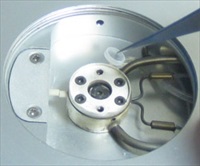Channels
Special Offers & Promotions
Scientists at the University of South Carolina have used the FDCS196 and DSC600 Linkam stages for cell cryo-preservation research
Market leaders in temperature controlled microscopy, Linkam Scientific Instruments report on the use of their popular FDCS196 and DSC600 stages for cell microencapsulation and immunoisolation research at the University of South Carolina, USA
 A group of scientists from the University of South Carolina (USC) and Shanghai Jiao Tong University are working on a jointly funded doctorial training programme, based at USC, investigating ways of using cell microencapsulation to protect cells from the undesired immune response known as immunoisolation. For this work, they have used Linkam's temperature stages, the FDCS196 and DSC600.
A group of scientists from the University of South Carolina (USC) and Shanghai Jiao Tong University are working on a jointly funded doctorial training programme, based at USC, investigating ways of using cell microencapsulation to protect cells from the undesired immune response known as immunoisolation. For this work, they have used Linkam's temperature stages, the FDCS196 and DSC600.
Emerging cell-based technologies are currently hindered by the danger of an undesired immune response. Microencapsulation of cells is one way to solve this problem and to make this a routine patient treatment, cell samples will need to be stored until required. However, cryopreservation research on microencapsulated cells is limited and consequently scientists have concentrated their initial research on the integrity of the capsules used during cryopreservation. Past studies have utilised slow freezing rates or vitrification, which have the associated problems of cell toxicity caused by high levels of cryoprotectants and the loss of integrity of the large microcapsules (>250µm).
Using the Linkam stages, the scientists have found that the Ca2+ ions and dimethylsulfoxide (DMSO) both help maintain microcapsule integrity during cryopreservation. The team has also successfully produced small (~100µm) capsules with a higher rate of integrity, using lower levels of cryoprotectants. These smaller microcapsules are also thought to facilitate better oxygen, nutrient and metabolite transport and so enhance the long-term survival of the encapsulated cells.
Xiaoming (Shawn) He, Ph.D., Associate Professor (now at The Ohio State University, Columbus, OH) led the team of scientists when he was at USC. He commented that the researchers used the stages for "studying cell dehydration, intracellular ice formation, freeze drying cells, and phase change phenomena. The stages are very important to these studies." He added "the main benefit of using the Linkam stage to do our research is that it can be used to not only achieve controlled heating, freezing, and drying but also quantify the heat release or absorption of phase change and visualize the microscopic morphologic changes in biological sample as a result of heating, freezing and drying. The best feature is its ease of use and how it can be easily mounted on a microscope for visualization."
The Linkam freeze drying cryo stage (FDCS196) is used with light microscopy techniques such as phase contrast and polarized light, to determine the collapse and eutectic temperatures accurately, and to investigate the freeze dried structure of complex samples. With a temperature range down to -196°C, both stage pressure and temperature can be accurately programmed to simulate industrial procedures. The Linkam Differential Scanning Calorimetry stage (DSC600) is a single cell system which is designed to overcome the problem of baseline drift caused by different heat flows into the sample and reference crucible. It has a small furnace and consequently a fast response time. The stage is suitable for reflected and transmitted light studies and can be used to collect optical and enthalpy change data simultaneously.
The research is ongoing as the scientists on the doctorial training programme continue to explore the morphological and biophysical responses of the microcapsules with and without living cells.
Visit Linkam at www.linkam.co.uk and learn about the broad range of applications in the field of temperature-controlled microscopy.
more news from Linkam Scientific
Media Partners


